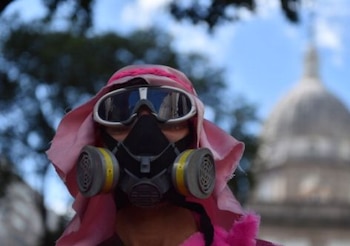
(ATR) Hold your breath! It may just save your life.
While intense scrutiny has been placed on the quality of Rio’s bodies of water in the lead up to the Games, it seems that the air quality has been mostly overlooked.
A report from Reuters has shown that the levels of particulate matter (PM), the most dangerous air pollutant, surpass what the World Health Organization (WHO) considers a recommended limit.
When Rio secured the Games back in 2009, they declared in its official bid that its air quality was within the WHO’s limits. However, Reuters’ studies have shown that this was not true seven years ago, nor is it true today. With the exception of Beijing 2008, the Rio Games are shaping up to be held in some of the worst air quality conditions in decades.
The cause of the pollutants is blamed mostly on the large number of vehicles on Rio’s crowded roads. According to Inea, Rio’s state environmental agency, there are 2.7 million vehicles in Rio causing upwards of 75 per cent of the air pollution. Inea did not respond to Reuters’ requests to see current PM data.
According to the country’s health profile published by the WHO, the number of deaths caused by both acute respiratory infections and chronic respiratory diseases has continued to steadily increase since the year 2000. Heart disease and cancers affecting the lungs and other organs are directly linked to the pollution, and have also continued to rise dramatically in recent years.
One of the legacies of the Rio Games is the improved transport network, with the inception of the Bus Rapid Transit (BRT) routes and extension of subway lines. Although designed to ease passenger travel for the Games and beyond, it was also hoped that the improved transport system would ease the ever-growing traffic. However it is reported that Rio's fleet of vehicles continues to grow by 100,000 a year.
Written by Alice Wheeler
For general comments or questions,click here.
20 Years at #1: Your best source of news about the Olympics is AroundTheRings.com, for subscribers only.
Últimas Noticias
Utah’s Olympic venues an integral part of the equation as Salt Lake City seeks a Winter Games encore
Utah Olympic Legacy Foundation chief of sport development Luke Bodensteiner says there is a “real urgency to make this happen in 2030”. He discusses the mission of the non-profit organization, the legacy from the 2002 Winter Games and future ambitions.

IOC president tells Olympic Movement “we will again have safe and secure Olympic Games” in Beijing
Thomas Bach, in an open letter on Friday, also thanked stakeholders for their “unprecedented” efforts to make Tokyo 2020 a success despite the pandemic.

Boxing’s place in the Olympics remains in peril as IOC still unhappy with the state of AIBA’s reform efforts
The IOC says issues concerning governance, finance, and refereeing and judging must be sorted out to its satisfaction. AIBA says it’s confident that will happen and the federation will be reinstated.

IOC president details Olympic community efforts to get Afghans out of danger after Taliban return to power
Thomas Bach says the Afghanistan NOC remains under IOC recognition, noting that the current leadership was democratically elected in 2019. But he says the IOC will be monitoring what happens in the future. The story had been revealed on August 31 in an article by Miguel Hernandez in Around the Rings

North Korea suspended by IOC for failing to participate in Tokyo though its athletes could still take part in Beijing 2022
Playbooks for Beijing 2022 will ”most likely” be released in October, according to IOC President Thomas Bach.


